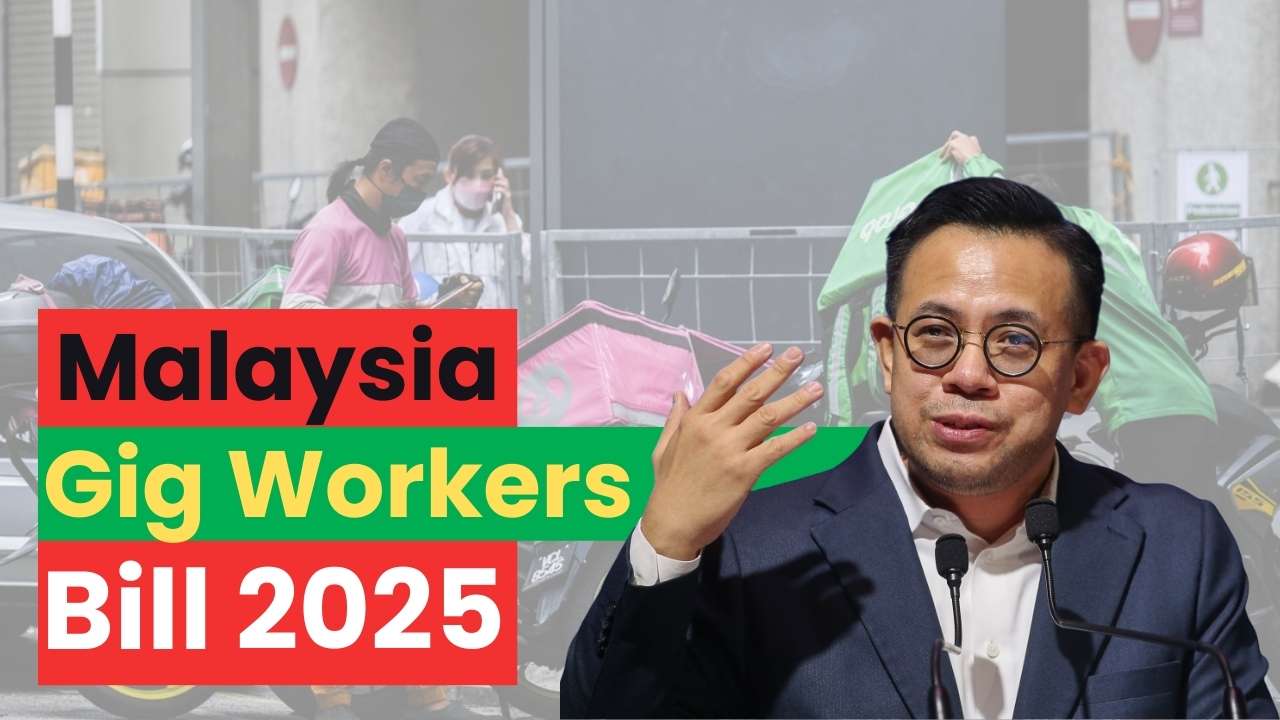On 26 August 2025, Malaysia took a historic step by tabling the Gig Workers Bill 2025, a bold move to safeguard the rights of over 1.2 million Malaysians driving the nation’s digital economy. For the first time, gig workers may finally gain legal recognition, fair pay, and social protection.
From food delivery riders weaving through traffic to freelance designers powering global brands, Malaysia’s gig workforce has long operated without a safety net. The new Bill promises to change that offering definitions, rights, and protections that could redefine the future of work in Southeast Asia.
Malaysia Gig Workers Bill 2025
In August 2025, Malaysia enter uncharted territory with the tabling of the Gig Workers Bill 2025, a landmark attempt to provide long-overdue recognition and protections for workers in the country’s booming gig economy.
For years, ride-hailing drivers, food delivery riders, freelance designers, translators, journalists, and even caregivers have been caught in a grey area: indispensable to the economy but without the safety nets or bargaining power of formal employees.
The new Bill aims to end that uncertainty. It seeks to put gig workers on the policy map by formally defining their role, creating legal safeguards, and establishing mechanisms for fairness in pay, dispute resolution, and social protection. For Malaysia, this move could mark one of its most ambitious labor reforms in decades.
Core Pillars of Bill
The Gig Workers Bill is built around four transformative pillars designed to address the biggest challenges faced by gig workers –
A Clear Legal Definition
For the first time, the law will officially define who qualifies as a gig worker. It covers a wide range of earners such as ride-hailing drivers, food couriers, independent artists, content creators, translators, medical service providers, and other self-employed professionals. By drawing this line, the government hopes to remove ambiguity and ensure gig workers are no longer left in legal limbo.
Fair Pay and Income Security
Gig workers often complain about delayed payments, fluctuating rates, or platforms cutting commissions without warning. Under the new law, workers will have the right to negotiate terms, be paid promptly, and access enforceable contracts. This could significantly reduce exploitation and wage insecurity.
A Dedicated Tribunal For Disputes
To address grievances swiftly, the Bill proposes a Gig Workers Tribunal. This body will handle disputes between workers and platforms, offering binding rulings. For many workers who previously lacked recourse, this tribunal promises an accessible and affordable path to justice.
Mandatory Social Security Coverage
Perhaps the most groundbreaking provision is the requirement that all gig workers register with SOCSO (Social Security Organisation). This would extend insurance, medical benefits, and financial safety nets to millions who have so far operated without protection in case of accidents, illness, or retirement.
Supporting these measures is a new Consultative Council that brings together workers, platform operators, unions, and policymakers. The council’s role is to keep dialogue alive, adjust rules when needed, and ensure fair representation.
Applause From Workers and Unions
Gig worker associations, representing more than 1.2 million Malaysians, have welcomed the Bill as a long-awaited recognition of their struggles. Many unions praised the government’s consultative approach, noting that at least 37 engagement sessions were held with stakeholders before the Bill was drafted.
Supporters argue that the Bill aligns with International Labour Organization (ILO) standards, particularly the principles of fair pay, decent working conditions, and social protections. For many overlooked workers, the law stands as a mark of visibility, value, and respect
As one delivery rider put it during a recent rally: “For the first time, we are being seen not just as service providers, but as workers with rights.”
Criticisms: “One Size Doesn’t Fit All”
Despite the enthusiasm, critics warn the Bill is not flawless. Policy groups such as MY Mobility Vision argue that the legislation risks oversimplifying the gig economy by grouping together vastly different occupations. They caution that applying the same rules to a part-time student delivering food and a full-time freelance journalist may create unfair burdens.
Key Concerns Include –
- Mandatory SOCSO Contributions – While important, some say the requirement could strain part-time or low-income workers who take up gig jobs for supplemental earnings.
- Council Representation – Questions remain about whether the new council will truly represent workers or be dominated by larger platforms and government appointees.
- Tribunal Limitations – With no clear provision for legal representation, individual gig workers may find themselves disadvantaged in disputes against well-funded companies.
As one policy analyst noted; “The Bill is bold, but it risks empowering big platforms while leaving smaller, independent gig workers to shoulder costs they can’t afford.”
The Road Ahead: Parliament’s Crucial Test
The first reading of the Bill was completed in Parliament on 26 August 2025 and the second and third readings are expected soon. Lawmakers are under pressure to fine-tune the proposal, given the intensity of public debate.
If passed, Malaysia would join a small but growing list of countries, including Spain, the UK, and parts of the US; that legally recognize gig workers. This could set a precedent for Southeast Asia, where the gig economy is expanding rapidly but labor protections remain patchy.
Promise vs. Perfection
The Gig Workers Bill 2025 carries enormous promise. It addresses real gaps by giving workers legal recognition, ensuring fair pay, and extending much-needed social protections. For millions who have lived without a safety net, this Bill represents hope and dignity.
Yet, the legislation must balance ambition with practicality. Unless carefully tailored to different types of gig work, it risks becoming a “one-size-fits-all” solution that could hurt the very people it intends to protect.
The coming weeks will determine whether Malaysia sets a gold standard for gig economy reforms or introduces a law that needs major reworking down the line. For now, the message is clear: the voices of Malaysia’s gig workers are finally being heard, and the stakes could not be higher.












